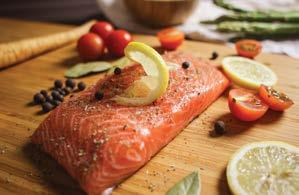
13 minute read
community spotlight
A Healthy Start to a New Year
Fresh Start Market Opens in Franklin
Advertisement
by Nancy Somera
It might be Bonnie and Mark Corso steering the ship, but the swell of enthusiasm from the Franklin community has supported their plans to open Fresh Start Market.
With more than 70 combined years of experience in the food industry—Mark in sales, distribution and grocery stores, and Bonnie in restaurants and food warehousing and distribution—an idea that was conceived nearly five years ago is now finally being realized. At first, they believed a stall at the now-popular Boston Public Market would be the right place to sell their curated selection of unique local products, but they were opposed to being in direct competition with the suppliers themselves, so they declined. With busy work lives and childrearing responsibilities to four, the over-extended Corsos decided to put their idea on hold.
Then the pandemic hit and the way of doing business in most industries, including the food industry, was turned upside down. Bonnie quickly realized that smaller local farms had inventory that needed distribution. “I saw that mom-and-pop farmstand sales were increasing, so I started to make calls to farmers directly. Not only was inventory available, but farmers told me they would adjust to meet our needs,” says Bonnie. So, Fresh Start Market took form.
A market study confirmed that the town of Franklin was not only receptive, but had been asking for a farm-to-table-style market with local, healthy, sustainably grown food. Once the Corso’s plans were learned, it soon became a community effort with numerous Franklin residents supporting their ideas. Faith Kaplan and Matthew Cail, of C&K Realty, provided invaluable advice and helped them find the market’s 6,200-square-foot space located in a plaza just outside the newly revamped center of town in high traffic and great visibility of route 140, close to Dean College and other local retailers. Also, Jim Ruzzo of BGood Restaurant sold them greatly discounted equipment that was no longer needed.
“We have to give credit to the entire community for its help,” Bonnie says, sharing that many people stepped up with recommendations for skilled workers like electricians and selling them infrastructure items at a reduced price. When a call for office furniture went out, furniture was donated, leaving them money for other things to make the storefront better. The experience has been soul-enriching. “People are genuinely good, helpful and supportive,” the Corsos maintain. “It has been wonderful working with like-minded people who are trying to do better and be positive. We all need that right now.”
Other ways to support the project include taking part in the Brick Wall fundraiser and becoming an investor through Mainvest, where investors purchase a revenue-sharing note and Fresh Start Market agrees to share a percentage of its future revenue until investors receive a return on investment. The market will also be participating in the Franklin First gift card program, a program designed specifically to support local businesses in Franklin which allows money to stay local.
When it opens, Fresh Start Market will be stocked with items from more than 3,000 farms and producers covering six New England states and a few key selections from New York. A butcher shop, fish counter (including a lobster tank), a bakery and floral shop are situated alongside aisles and refrigerator walls housing produce, staples and ready-to-eat food made from only clean ingredients. Kitchen protocols are in place to accommodate particular diets, including vegan, keto and gluten-free, where cross-contamination cannot occur. The Corsos have been able to keep prices competitive by negotiating with farms and butchering and packaging its own meat in the on-site commercial kitchen. “Our customers will enjoy better-quality meat and poultry for the price,” Bonnie explains, believing that they will be able to compete with Whole Foods Market, but on a smaller scale. Curbside pickup and delivery will also be available.
With an eye to the future, Bonnie continuously looks for new trending foods and enjoys finding ways to create healthy, marketable products out of all local ingredients. Many local startup food businesses have already found a home at Fresh Start Market. Hiring is currently underway and anyone that is 18+ with experience in the following departments or skills should contact the Corsos: deli counter, commercial baking, health and beauty, butcher, cashier, distribution and food handling.
Despite the long days readying the store for opening, Bonnie shares, “Mark is always telling me that we can’t take ourselves too seriously; that we need to have fun with it.” That’s exactly what they have done and are eager to share their enthusiasm, fun spirit and Fresh Start Market with the community.
Location: 365 W. Central St., Franklin. For more information, call 774-847-1128, email FreshStartMkt@gmail.com or visit FreshStart. market. Follow on social media at @FreshStartMkt.
Nancy Somera is the managing editor of Natural Awakenings Boston and Rhode Island editions. Contact at Editor@ NaturalAwakeningsBoston.com.




Integrative Hospital Care
Medicine Embraces Holistic Modalities
by Marlaina Donato
Thirty years ago, hospital patients were treated for symptoms based on the Western medical model, and holistic modalities were excluded, largely due to a lack of reliable scientific studies. More recently, because of promising research, the traditional template is expanding. The Academic Consortium for Integrative Medicine & Health encompasses 75 university health centers and health systems that offer integrative approaches—a remarkable seven-fold increase in 21 years. America’s top hospitals, including the Memorial Sloan Kettering Cancer Center, the Mayo Clinic, the Duke University Medical Center and the Yale New Haven Hospital, now offer therapies such as acupuncture, reiki, homeopathy, touch therapy, yoga, clinical aromatherapy and chiropractic.
According to a report in Advances in Medical Education and Practice, nearly half of Americans receiving medical care use alternative medicine (although 80 percent don’t inform their doctors) and physicians agree on the importance of further research and training in such modalities. A 2017 University of California survey published in the Journal of Alternative and Complementary Medicine found that hospital patients of all ages were willing to pay out of pocket for healthier food, therapeutic massage and energy work.
DISEASE: THE BIG PICTURE
“Research has repeatedly shown that even with full medical access and optimal medical treatments, a population’s health improves by only about 15 to 20 percent. The rest comes from lifestyle, environment and the social and personal determinants of health. Even factors like emotional health, what you feel is your purpose in life and what motivates you to be healthy plays a role,” says physician Wayne Jonas, in Alexandria, Virginia, a clinical professor of family medicine at Georgetown University and former director of the World Health Organization Center for Traditional Medicine. As executive director of Samueli Integrative Health Programs, which aims to make integrative health regular and routine, Jonas emphasizes that patients become healthier and medical costs are reduced when they are engaged in the healing process.
For Jonas, the shift toward integrative health care has become most evident during the current opioid crisis and the search for non-pharmacological approaches like acupuncture and therapeutic massage therapy for pain management. “The evidence body for many of these approaches has grown tremendously over just the past five years, and has shown a spotlight on what works and what doesn’t. These approaches are now recommended in national guidelines as mainstream for chronic pain.”
Denise Millstine, integrative physician and internal medicine specialist at Mayo Clinic in Arizona, concurs: “The opiate crisis is an example of the need to broaden our clinical toolbox to incorporate care strategies that are less risky. I believe this change has been multifactorial, based on patient demand and more awareness of the importance of lifestyle management.”
Patient demand is also fueled by a desire to avoid medication side effects. In 1998, the Journal of the American Medical Association reported that 106,000 hospital deaths take place each year from adverse reactions to prescription drugs. With more than half of Americans already taking a pharmaceutical drug, and three being the average, adverse side effects can easily mount in a hospital setting.
For Millstine, integrative medicine offers many solutions. “We might recommend the best medication or provide cutting-edge therapies, but without considering stress management, resilience, movement and what people ingest, it’s hard to get optimal results. Integrative medicine expanded my approach to include nutrition, exercise, mind-body (connection), spirituality and other medical philosophies like Traditional Chinese Medicine (TCM) in the treatments and therapies are available to primary medical care. The clinic brings topatient’s therapeutic plan.”
WHOLE-PATIENT CANCER CARE
A 2016 meta-analysis by Taipei Medical University published in the journal PLOS ONE concluded that certain applications of acupuncture reduce pain and opioid use on the first day after surgery. Acupuncture—an ancient modality based on the concept of energy meridians in the body—is also offered in many major hospitals to offset the side effects of chemotherapy and radiation.
Acupuncture treatments at the Mayo Clinic are given in a calming atmosphere of soft lighting and music, and performed by trained doctors, as well as licensed acupuncturists with a firm TCM foundation.
Integrative health care addresses the emotions that accompany a cancer diagnosis, and patients undergoing conventional treatment now have access to not only acupuncture but therapeutic massage, meditation, movement therapy, clinical aromatherapy, herbal applications, biofeedback and yoga. Millstine says of theMayo Clinic, “We have oncology-trained massage providers who are comfortable with what is and what isn’t safe after someone has had a cancer diagnosis and/or treatment.”
Jonas highlights that when given under the supervision of a doctor and with conventional cancer care, complementary therapies may help people to manage cancer symptoms, boost overall well-being, better handle side effects of treatment and reduce the risk of cancer recurrence. “Integrative cancer care can help by activating one’s ability to heal and feel better physically and emotionally,” he says. “Lectures on nutrition, yoga classes and support groups for cancer patients are now common.”
The Urban Zen Integrative Therapy Program, launched by American fashion designer Donna Karan in 2009 after her husband died from cancer, partners with heavy hitters such as the American Cancer Society and the Beth Israel Medical Center, in New York City. In many hospital settings, Urban Zen is creating “Zen dens”, calming nooks where staff can discuss cases with colleagues, take a break for self-care or talk to their patients in a nurturing environment. Urban Zen’s dedication to healthcare integration is international and promotes therapeutic applications of reiki, essential oil therapy, nutrition and other contempla-

Boston Hospitals Using Integrative and Holistic Therapies
Here is a limited list of local hospitals pro- Medical Center can help patients cope with acupuncture, yoga and music therapy, are viding holistic therapies. Wherever treat- their symptoms so that they can focus on available for patients and their families, as ment is received, be sure to ask if holistic their fight against the disease. well as past patients. complement one’s care. The Katherine A. Gallagher Integrative The Integrative Therapies Team at Boston Therapies Program at Mass General Hospi- Children’s Hospital provides a wide range The Osher Center for Integrative Med- tal provides clinical interventions that rec- of holistic therapies designed to compleicine, a collaboration between Harvard ognize the whole person by increasing pa- ment a child’s medical care. The focus is on Medical School and Brigham and Women’s tient self-awareness and self-care to enhance restoring a child’s mental balance, emotional Hospital, is an integrated treatment model well-being. Free wellness services, such as vitality and sense of creativity using massage connecting gaps in patient care and offering therapy, guided imagery, reiki, acupuncture, additional healing modalities to complete expressive arts, yoga and therapeutic touch. tive care. gether a team of the region’s top clinicians to Integrative health approaches can be used serve a common mission—to enhance the in combination with conventional rehabilibody’s natural ability to heal and to maintain tation medicine at the Spaulding Rehabiligood health. Services include acupuncture, tation Network to maximize health, quality chiropractic care, craniosacral therapy, ther- of life and function. No matter one’s injury apeutic massage, tai chi, yoga, dietary herbs, or ability, techniques such as meditation, vitamins and supplements and nutrition yoga, acupuncture, tai chi, reiki and massage counseling, among others. therapy can help individuals access their body’s own inner healing resources, find By integrating reiki therapy and other com- their strength and harness the power of the plementary services into traditional cancer body, mind and spirit to improve recovery, treatments, the Cancer Center team at Tufts manage stress and find peace of mind.
ENERGY MEDICINE GOES MAINSTREAM
“Alternative therapies are no longer considered ‘alternative’ when conventional medicine adopts them—for example, using calcium and vitamin D supplements, which are a standard consideration,” says Millstine. “With high-deductible plans, many patients are accustomed to paying out of pocket for care, thus making payment for alternative providers possibly more palatable.”
Reiki, a Japanese form of energy medicine once considered alternative, is now offered at major hospitals like Yale New Haven, where it’s given free of charge to cancer patients. Many hospitals are also offering classes in energy work to families of patients, hospital staff and the community.
“A medical doctor introduced me to the practice when my grandmother was diagnosed with lung cancer,” says Denise Baron, a Philadelphia-based reiki practitioner who works with referrals from clients and wellness professionals. “A hospital does not hire me directly, but the staff know I am available. I’ve worked on patients post-surgery, during and after births, people with cancer and people in hospice. I would say 96 percent of clients walk away with a deep experience of peace, harmony and lower stress levels.” Most recently, she has seen an increase in nurses asking for support during stressful times, with many wanting to learn how to practice reiki themselves.
According to a 2017 study published in the Journal of Evidence-Based Complementary and Alternative Medicine, reiki is more effective than a placebo and activates the parasympathetic nervous system via the vagus nerve. Results include lower blood pressure and less anxiety and depression. Other research shows that the modality also reduces nausea, improves appetite and lessens fatigue.
HOLISTIC NURSING’S ROLE
Collaborating with physicians and holistic practitioners, nurses play a key role in integrative hospital care. “We all work together to facilitate the client towards a higher level of well-being. Each profession brings something to the table,” says Margaret Erickson, in Cedar Park, Texas, CEO of the American Holistic Nurses Credentialing Corporation.
The nurse’s role in a patient’s healing journey is an intimate one, and holistic nurses ensure that the whole patient is tended to. “The roots of holistic nursing, grounded in holism, were verbalized over 150 years ago by Florence Nightingale,” says Erickson. “She believed in the mind-body-spirit-emotion connections and that all aspects need to be nurtured in order for people to heal.”
Due to increased demand, more nursing schools are creating educational programs grounded in holistic philosophy, she says. “What makes a nurse holistic is not the skills or alternative therapies she/he/they do, but rather how they show up in their interactions with others. They value and recognize that they are gifted with sharing a person’s most vulnerable moments, and that this shared space is sacred.”
Some holistic nurses may use healing therapies such as guided imagery,

aromatherapy, energy work, bodywork, deep breathing, mindfulness and meditation to help both their clients and other healthcare providers.
Those in the field of integrative medicine agree that the future of medicine is now. “People are becoming more selfaware and taking responsibility for their health and life. Consciousness is growing [by] leaps and bounds,” says Baron.
Jonas, drawing on 40 years of experience, agrees. “By working as partners with our patients to help find the care that works for them, we can help them achieve better health and quality of life.”

Marlaina Donato is the author of several books and a composer. Connect at AutumnEmbersMusic.com.






